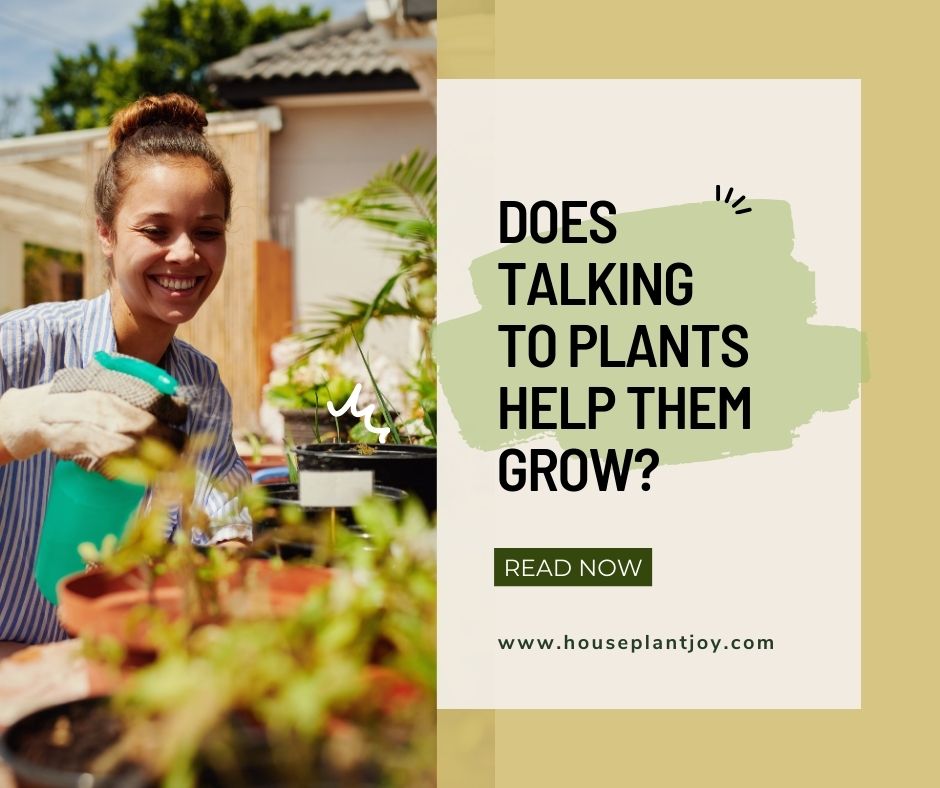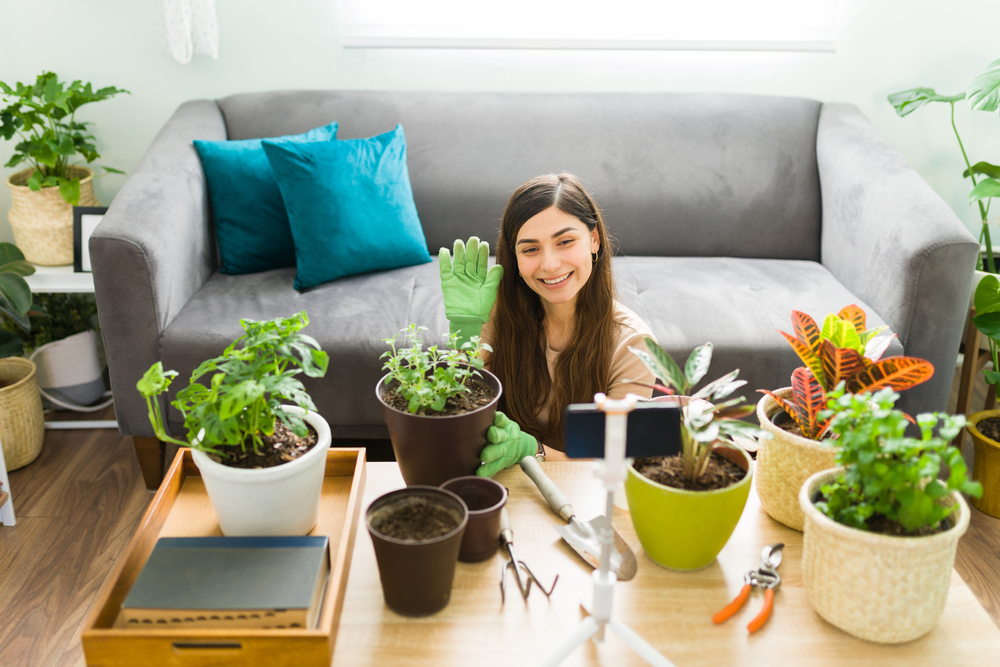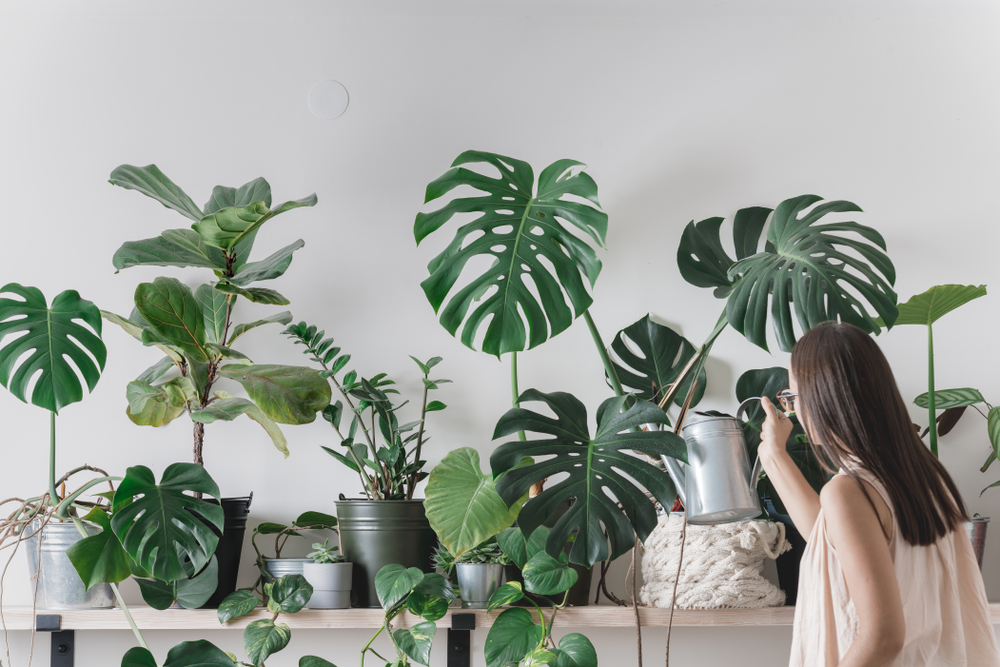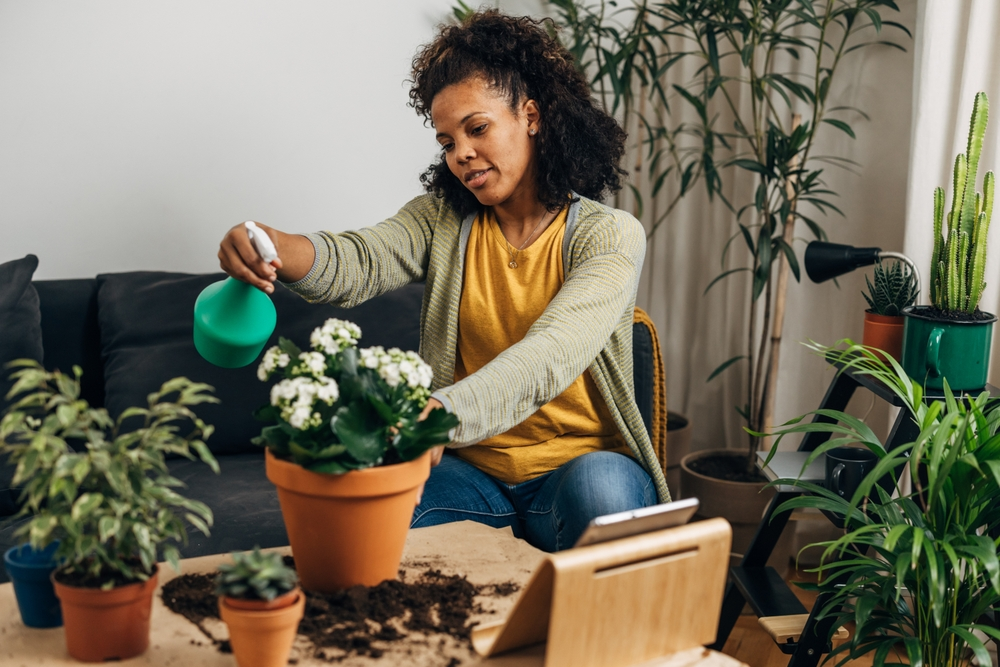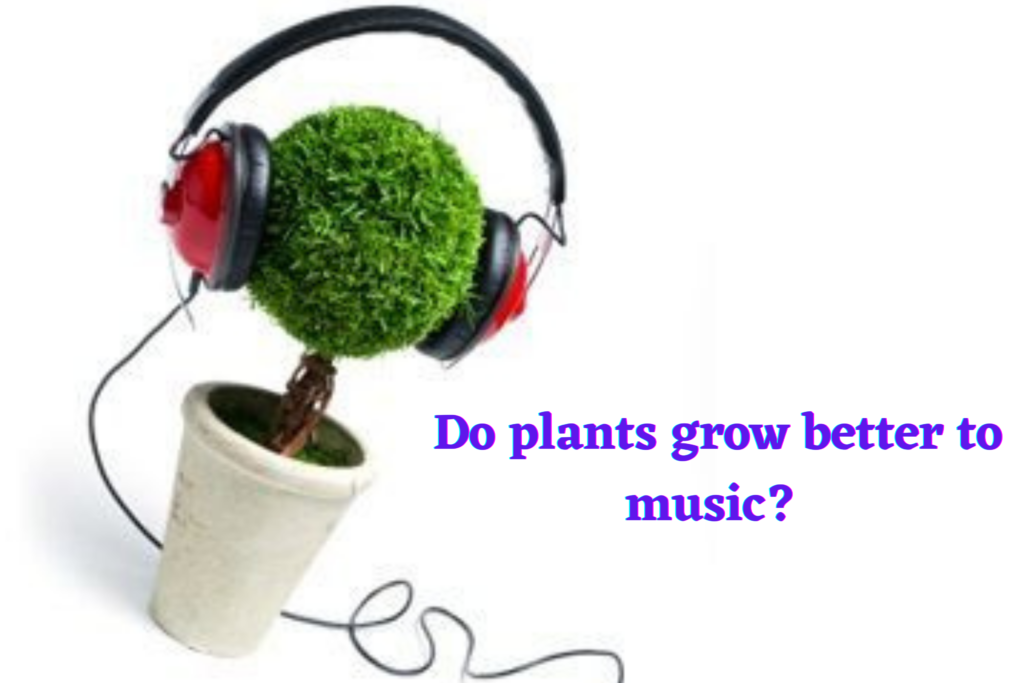HousePlantJoy is supported by our audience. When you purchase through one of our links, we may earn a small affiliate commission. As an Amazon Associate I earn from qualifying purchases. Your cost is not affected.
==================
Have you ever whispered secrets to your favorite fern or hummed a tune to your blossoming roses? Many of us have. There’s something magical about the idea that our plants might understand us. But have you ever wondered if talking to your plants makes a difference in how they grow? Well, you’re not alone in that thought. I hope this piece sparks joy and intrigue. So, let’s get started!
The Age-Old Question: Does Talking to Plants Help them Grow?
“Does talking to plants help them grow?” is as old as the hills. It has fascinated scientists, gardeners, and plant lovers alike for centuries. I, for one, have often found myself whispering encouraging words to my houseplants, hoping to give them an extra boost. But does this age-old practice hold any merit? In this article, I’ll explore the science behind this intriguing query and try to unravel the truth.
Truth vs Folklore
This question is rooted in ancient folklore and superstition, where people believed plants were sentient beings. Many people thought plants were capable of understanding human speech. Over the years, this belief has been passed down from generation to generation, creating a fascinating narrative that continues to captivate us.
Strictly Science
Let’s dive deep into this fascinating topic and see what science has to say. We’ll explore everything from the role of carbon dioxide in plant growth to the impact of sound on plants. So, let’s get started!
The Concept of Talking to Plants: Do Plants Like Being Talked To?
The idea of “Do plants like being talked to?” is fascinating. Plants, unlike animals, don’t have a nervous system. They can’t hear or understand speech in the way we do. However, studies have shown that plants can respond to sound vibrations, which can impact their growth.
Some research even suggests that plants can differentiate between different types of sounds. For instance, they may respond more positively to certain music or frequencies. So, while plants may not “like” being talked to in the conventional sense, they may respond to the vibrations caused by our voices.
Case Studies: Does Talking to Plants Help Them Grow?
Several case studies have been conducted to explore the question, “Does talking to plants help them grow?” One of the most notable is the “talking plants” experiment conducted by the Royal Horticultural Society. In this experiment, different people read to tomato plants, and the plants that were read to grew taller than those that were not.
However, it’s important to note that while these findings are intriguing, they don’t provide definitive proof. More research is needed to fully understand the potential benefits of talking to plants.
Control Talk to Plants: How and Why It Works
Control talk to plants is a method where a controlled amount of speech or sound stimulate plant growth. The idea is that the vibrations caused by our voice can stimulate the plant’s growth processes.
This method is interesting, and some research has shown positive results. However, more research is needed to understand how and why it works fully, and to determine its effectiveness compared to other plant growth methods.
The Impact of Sound on Plants
Sound is a form of energy that travels in waves, and these waves can cause vibrations. Some research has shown that these vibrations can stimulate plant growth, potentially explaining why talking to plants might help them grow.
However, other research has found that sound vibrations can stimulate plant growth, but the effect is likely minimal. Furthermore, the type of sound and the frequency may also play a role, with some research suggesting that certain music or frequencies might be more beneficial than others.
Other Ways to Promote Plant Growth
While the question “Does talking to plants help them grow?” is fascinating, remember that there are many other proven ways to stimulate plant growth. These include providing your plants with the right amount of sunlight, water, and nutrients and ensuring they’re planted in the correct type of soil.
Pruning, aerating the soil, and controlling pests and diseases are also necessary. And let’s remember the importance of love and care. While it might not be scientifically measurable, soil type sense when they’re being cared for, and respond positively to it.
The Psychological Benefits of Talking to Plants
While the physical benefits of talking to plants are still up for debate, the psychological benefits are more clear-cut. Talking to plants can be a therapy, helping reduce stress, improve mood, and promote peace and tranquility. Indeed, the psychological boost makes it worth trying.
A close relationship with our plants offers good vibrations to plants and people. We provide a sense of well-being for one another. Spending time with your plants often creates a sense of happiness and peace.
Furthermore, talking to plants helps create a connection with nature, promoting a sense of responsibility and care. So, while your plants may or may not benefit from your chats, you certainly will!
Misconceptions About Talking to Plants
Many things need to be clarified about talking to plants. One of the most common is the belief that plants can understand human speech. While plants can respond to sound vibrations, they don’t understand language like ours.
Do Plants Benefit From CO2 Boost?
Another common idea is that talking to plants gives them enough carbon dioxide to boost their growth significantly.
Carbon dioxide is essential for photosynthesis, the process by which plants produce food. When you talk or sing to your plants, you exhale carbon dioxide, which the plant absorbs to allow it to go through photosynthesis and grow. In turn, the plant releases oxygen back to you, which is beneficial and essential for your health. However, it is still being determined in controlled settings whether talking or singing to plants significantly impacts their growth. Future evidence and other studies are needed to confirm this.
Notably, carbon dioxide has been shown to increase plant growth, but this growth is limited. Adverse effects from excess CO2, like global warming, ultimately hurt plants more than help them. Several studies illustrate that plants grow more with a little extra carbon dioxide in controlled settings and a bit of the natural environment.
So, while talking or singing to your plants may not significantly impact their growth, providing them with sufficient carbon dioxide is essential for their survival and growth.
Unveiling the Truth About Talking to Plants
So, does talking to plants help them grow?
The answer is complex and somewhat inconclusive. While some studies suggest that plants may respond to sound vibrations, more research is needed to understand the potential benefits fully.
What is clear, however, is that talking to plants provides psychological benefits, helping to reduce stress and improve mood. And who knows, your plants might appreciate the company!
More Research
Some studies have shown an effect on plants from music or single tones, while others haven’t. These studies are rarely performed in the same way, making them difficult to compare, so there is no consensus yet.
However, a study by the Royal Horticultural Society discovered that talking to your plants can help them grow faster. They also found that plants grow faster to the sound of a female voice than to the sound of a male voice. Another study by South Korea’s National Institute of Agricultural Biotechnology shows that plants begin to react to sound at 70 decibels. Lucky for us, 70 decibels is the sound level for the average human conversation.
While these studies suggest that plants do respond to sound and vibrations in music or your voice can affect the plant in a way that they grow better, more research is needed to confirm this theory.
Do You Talk to Your Plants?
Please share your experience in the comments below. Whether you’re whispering encouraging words to your succulents or conducting your own experiments with sound vibrations, I’d love to hear about it!
FAQs
Do plants really "listen" when I talk to them?
No, plants don’t have ears like humans, so they don’t “listen” in the way we do. However, some studies suggest that the vibrations from our voice might affect their growth.
Is it the words I say or just the sound of my voice that matters?
It’s more about the sound and vibrations than the actual words. Whether you’re reading a book or chatting about your day, it’s the sound waves that might have an impact.
I've heard that playing music for plants helps. Is this true?
Yes, some research has shown that certain types of music, especially classical, can promote plant growth. But remember, it’s still about the vibrations and frequencies, not the lyrics!
Do plants have feelings or emotions like humans?
Plants don’t have feelings or emotions in the way humans do, but they do respond to their environment. They can react to light, touch, and even certain chemicals in the air.
So, should I start talking to my plants every day?
It can’t hurt! Even if it’s not clear how much it benefits the plants, talking to them can be therapeutic for you. Plus, spending time with your plants often means you’re more attentive to their needs like watering and sunlight.
Learn More About Houseplants!
Discover facts and tips about your houseplants! Join us on Facebook, Instagram, and Twitter for beautiful photos, plant care tips, and a community that celebrates the joy of indoor gardening.
Facebook: https://www.facebook.com/houseplantjoyblog
Instagram: http://instagram.com/houseplantjoy20
Twitter: https://twitter.com/HouseplantJoy
Let’s nurture our green spaces together!

